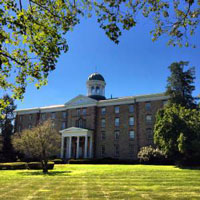October 28, 2016
When we preachers are at our best, we study a Bible passage thoroughly as we prepare for each sermon. We usually ask a series of questions about the passage, most of which help us discover what this text says to the people who will hear the sermon. Recently I heard a presentation that challenged me to bring new questions to the text, to help encourage my listeners to respond in a particular way.
These questions came at a fascinating consultation at Princeton Theological Seminary concerning a center for church planting and revitalization. Planters, professors, and denominational leaders joined together to dream about what this new ministry might look like, and how it might help support efforts to develop and renew congregations who more consistently join in God’s mission to the world. These congregations seek to live in a way that the people who primarily benefit from the worshiping community’s or church’s ministry are not the members, but rather people in the community or world.
Lisa Marie Bowens, assistant professor of New Testament, helped lay the groundwork for the consultation with a presentation about the most faithful ways to approach a biblical passage in order to invite and challenge listeners to join God’s mission. Drawing on the work of Michael Gorman in Elements of Biblical Exegesis, she presented a list of questions that had the room buzzing. In addition to my regular questions, I’m going to incorporate the ones she suggested the next time I prepare to preach a sermon.
- What does this text say, implicitly or explicitly, about the Missio Dei (Latin for “the mission of God”) and the missional character of God?
- What does this text reveal about humanity and the world?
- What does this text say about the nature and mission of God’s people in the world? About the church as an agent of divine mission rather than an institution or civic organization?
- How does this text relate to the larger scriptural witness in both testaments to the Missio Dei and the mission of God’s people?
- How does this text call us to participate in God’s mission?
- What powers that could deceive, seduce, and harm the world or the church does this text unveil and challenge and call us to unveil and challenge?
- How does this text call us as God’s people to be both different from and involved in the world?
Whether you’re studying the Bible as a preacher or as an individual, these questions are helpful. I look forward to seeing how they orient us outward in evangelism and service, to participate in the divine mission to the world.
Charles B. “Chip” Hardwick, Director, Theology, Formation, and Evangelism
Today’s Focus: Princeton Theological Seminary
Let us join in prayer for:
Presbytery of New Brunswick Staff
Rev. Dr. John Williams, Executive Director
Rev. Dr. D. Paul LaMontagne, Stated Clerk
Mrs. Ilene M. Black, Office Administrator
Elder Linda Gilmore, Treasurer
Rev. Wendi Werner, Moderator
Rev. Jim Huang, Vice-Moderator
PC(USA) Agencies’ Staff
Matt Hinkle, FDN
Lee Hinson-Hasty, FDN
Let us pray
Praise to you, abundant God who knows no scarcity! Praise to you, living God who makes all things possible and new! Amen.
Daily Lectionary
Morning Psalms 84; 148
First Reading Nahum 2:13-3:7
Second Reading Revelation 13:1-10
Gospel Reading Luke 12:13-31
Evening Psalms 25; 40
![]() You may freely reuse and distribute this article in its entirety for non-commercial purposes in any medium. Please include author attribution, photography credits, and a link to the original article. This work is licensed under a Creative Commons Attribution-NonCommercial-NoDeratives 4.0 International License.
You may freely reuse and distribute this article in its entirety for non-commercial purposes in any medium. Please include author attribution, photography credits, and a link to the original article. This work is licensed under a Creative Commons Attribution-NonCommercial-NoDeratives 4.0 International License.
